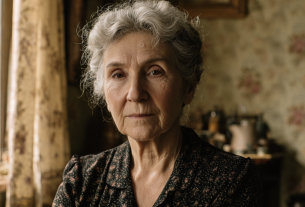— Vera, hi. Mom called. Her violets are dying completely — they urgently need to be repotted. Go visit her, help out, okay? You always manage plants so well.
The kitchen was filled with the thick, warm aroma of fried onions and carrots — homey, cozy, as if inviting to forget everything else. But this time it seemed to freeze in the air, turning into a dense haze. Vera didn’t turn around. She kept stirring the sauté, and only the tense line of her back, outlined beneath the light fabric of her t-shirt, betrayed that she had heard everything. Her movements were sharp, almost aggressive, as if she wasn’t cooking dinner but trying to cut through something invisible squeezing her from within. The sizzling of the oil was the only sound in the silence of the apartment.
Oleg stood in the doorway, still in his business suit, his tie loosened. Calm confidence showed on his face — like a man making a small, unburdensome request. He set his briefcase against the wall and headed for the fridge, as if unaware of the tension hanging in the air, or rather, choosing to ignore it.
Vera turned off the stove. Slowly she turned around, wiping her hands on a towel. Her face remained even, almost expressionless, but her eyes, which had been tired moments ago, now grew cold, deep like dark wells.
— This is the third time this week, Oleg.
He was just taking out a bottle of water and froze, frowning slightly.
— So what? What’s the problem?
— On Monday, — she began evenly, without a trace of emotion, which made her words feel especially heavy, — I left work early to take your mother to a private clinic to pick up her tests. Because she “didn’t want to stand in line.” On Wednesday, during lunch, I ran around three pharmacies to find her blood pressure medicine. Because she was “too lazy to look for it herself.” And today, Friday, after five days of hard work, I’m supposed to rush across the entire city to repot her flowers. Because apparently, I have a “green thumb.”
She paused without looking away.
— I have my own life, Oleg. My own job. My own fatigue.
— Why are you getting worked up again? — he put the bottle on the table with an irritated thump. — It’s your mother. She’s old, she has it hard. Is it really so hard to help?
His words, which before made her feel duty-bound and guilty, now sounded like a spark that ignited powder.
— Your mother, — Vera said sharply. Her voice became hard as stone. — Only yours. And she’s not struggling — she’s bored. She doesn’t need help, she needs attention. She needs constant bustle around her, someone running errands. And I’m her free helper, courier, and entertainment. And you — you support this. You consider it normal.
— You’re my wife! You have to respect my mother! — His voice grew louder, his face flushed. He resorted again to the only argument he knew.
Vera smiled shortly — silently, bitterly. It was not a smile but a blow.
— Respect — yes. Be her personal servant — no.
— But she asks…
— I don’t care what she wants! She’s a stranger to me. So deal with her yourself. Clear?
She stepped forward, and in her eyes there was neither fear nor hesitation.
— From today, I won’t fulfill a single one of her requests. If she calls — let her deal with you. It’s all your problem. If you want — take your things after work and go repot her violets, carry medicines, take tests. If you don’t like it — you can pack up and move in with her. There you’ll be the perfect son, and she will appreciate you accordingly.
Throwing the towel on the table with force, she made it clap against the wood — a wet, final sound. This was not a dialogue. This was a sentence. The last point. The topic closed forever.
Oleg flew out of the apartment as if chased by disaster. He didn’t take his briefcase, didn’t check his keys. Vera’s words burned like slaps delivered in front of everyone. In the elevator, looking at his reflection in the dull metal, he did not see a confident leader but only a confused boy scolded in public. He felt humiliated, exposed to shame in his own home — on the territory he considered his. Everything he considered stable — the obedient wife, the cozy and quiet domestic life — collapsed in five minutes on the kitchen floor.
He got into the car and sat for a long time, gripping the steering wheel until his fingers went white. Going to his mother’s because of flowers? This thought now seemed absurd. The flowers were just an excuse. The essence was different — a rebellion, a public humiliation. He started the engine. The car moved, taking him away from the home where his authority was publicly crushed. He was not going to fulfill an errand — he was going to his command center, to his commander-in-chief.
Galina Sergeyevna’s apartment greeted him with its usual smell — Valocordin, strong tea, old books, and something dusty, eternal. The smell of stability, order, unshakable hierarchy. The door opened almost immediately — as if she was waiting. In a dark blue robe with an embroidered collar and a neat hairstyle, she glanced at her son with a quick, penetrating look.
— What happened? You look like you’ve been through a battle. Come in, the kettle is already on the stove.
He silently entered the living room and collapsed onto the old but well-kept sofa. Galina Sergeyevna didn’t fuss. She brought tea, put down some rusks. Sat in her armchair — a royal throne from which she ruled her small empire. Only when he took the first sip did she say again, more strictly:
— Oleg, I’m waiting.
And he spoke. He laid out everything — but in his version. He told how he came tired, how he carefully passed on the request. Described how Vera suddenly exploded, how she shouted, how she insulted his mother. He omitted the tests, the pharmacies, presenting everything as if the violets were the first and only demand in a long time.
— She said… she doesn’t care about your affairs, — he whispered, looking into the cup. — That you’re nobody to her.
Galina Sergeyevna was silent. No sigh, no gesture. Only set down the cup — the porcelain rang quietly. Her face stiffened. Her gaze turned icy.
— Did she really say that? “Nobody”? — she asked quietly, but with such force as if driving a nail. — After everything I’ve done for her? After taking her into the family? Very interesting.
She went to the window where the violets stood. Despite Oleg’s words, the plants looked healthy — maybe one leaf was yellowed, but overall — well cared for, strong. She absentmindedly ran a finger over the velvety leaf.
— So she decided she could talk to us like that, — not a question but a statement. She turned around. — What are you going to do, Oleg? Swallow it? Let her behave like that further? Today she refused with the flowers — tomorrow she’ll throw you out, citing “personal freedom.”
— What can I do? — he spread his hands helplessly. — She said I should move to you if it doesn’t suit me!
— Nonsense. You’re not moving anywhere, — cut off Galina Sergeyevna. Her voice became commanding, authoritative. — We’ll do it differently. We’ll teach her a lesson. But not with a scandal. Scandal is for rude people. We’ll be smarter. Tomorrow we’ll come to her together.
— What if she closes the door?
— She won’t. You’re her husband. You have the key. We’ll come in peace. With a cake. We’ll drink tea, talk about the weather, health, whatever. We’ll be polite, kind, benevolent. But our politeness will be so cold, our attention so intrusive that she herself will feel like a stranger in her own home. She’ll understand her rebellion failed. She’ll understand her place is here, — she tapped the armrest with her finger — next to you, under our rule.
They came the next day, Saturday, around noon. Vera didn’t hear the doorbell. But she heard — the quiet, ominous grinding of the key in the lock. She was sitting in the living room with a book on her lap, not reading. Waiting. All evening and morning she ran possible scenarios through her head, and this one — with a “peaceful visit” — seemed most likely. She was not wrong.
The door opened and Oleg appeared on the threshold. Behind him, like a living shield, stood Galina Sergeyevna. In her hands she held a cardboard box with a cake — a symbol of their “peaceful” invasion. Oleg’s smile was strained, unnatural. His mother’s face showed feigned care, artificially soft and gentle.
— Verunya, hi! — he exclaimed, stepping into the hallway. — We decided to check how you’re doing, how things are. Mom baked your favorite “Napoleon.”
Vera silently put aside the book and stood up. She didn’t smile. She just stood watching them take off their shoes and come inside. Watching Galina Sergeyevna hand the box to him and, without waiting for an invitation, confidently enter the living room as if inspecting her domain.
— Hello, Verochka, — she said, her voice sweet but with ice beneath the honey. — It’s stuffy here. Oleg, open the window, air it out. Otherwise, there’s nothing to breathe.
She ran her finger over the dresser lid, looked demonstratively at the dust, and without a word, went further. Vera watched this without blinking, her eyes cold as glass.
— Hello, Galina Sergeyevna. Yes, dusty. Yesterday cleaning was not scheduled. There were more important matters.
Her mother-in-law pretended not to hear the sarcasm. She stopped in the middle of the room, looking around as if assessing.
— Haven’t you had lunch yet? Oleg must be hungry after the trip. He’s gotten so thin, pale. You don’t feed him at all, my girl?
Oleg, who was just placing the box on the kitchen table, froze. This was no longer a question about care — it was a blow to the most vulnerable: to his male dignity, to his dependence.
— Galina Sergeyevna, — Vera answered calmly, entering the kitchen, — Oleg is an adult. He chooses for himself what and when to eat. If he wants — he’ll cook for himself. Or come to you. You always have everything laid out, right?
A heaviness hung in the kitchen. Oleg shifted his gaze from his wife to his mother, his face distorted by confusion. The plan was collapsing. Instead of a submissive, embarrassed woman, they met a cold, unshakable wall.
— Vera, enough! — he burst out. — Mom came with good intentions, brought a cake, and you…
— What about me, Oleg? — she turned to him. — Am I supposed to jump for joy because you barged in without ringing to check me? To point out dust and lecture me on how to “properly” take care of my husband?
The mask of kindness on Galina Sergeyevna’s face began to crack. Her eyes narrowed.
— I came because I’m worried about my son! I see things aren’t well in the family. Instead of being there, you throw tantrums over nonsense!
— Nonsense — is that your violets? — metal sounded in Vera’s voice. — Your habit of calling me for every little thing as if I were your servant? You call that “nonsense”? I told you everything yesterday. Apparently, you didn’t get it. I’ll have to repeat — and for your mother.
She turned to her mother-in-law, looking straight into her eyes.
— You didn’t come for tea. You didn’t come for reconciliation. You came to humiliate me, to show who’s boss here. You thought I’d chicken out, start making excuses, and tomorrow I’d rush to fertilize your flowers? You were wrong. Categorically.
The cake on the table now looked silly, ridiculous, like a symbol of a failed ritual. Galina Sergeyevna’s plan collapsed instantly. The cunning psychological pressure game turned into an open, harsh confrontation. And Vera was not going to give an inch.
— Oleg, do you hear? Look at her! — the mother-in-law’s voice trembled, but not from weakness, but from powerless rage. She stepped toward her son, seeking support. — I put my whole soul into this family, and she… she treats me like this! And for what? For flowers! I just asked for help — my hands hurt, my joints… My little violets…
It was her last move — pity. An appeal to son’s sense of duty, conscience, an attempt to portray Vera as a callous, heartless woman abandoning her old mother. Oleg shuddered. He looked at his wife with pain, with a plea: “Give in, at least pretend, just take a step toward me.”
But Vera did not look at him. She looked at Galina Sergeyevna. In her eyes there was no malice, no cruelty. Only clarity. Cold, like a winter dawn. She heard the key word. “Violets.” A small, naive, artificially touching symbol of this whole game.
Without a word, she turned and left the kitchen. Her steps were calm, confident. Oleg and his mother exchanged glances — what was happening? Was she giving up? Or leaving? The air grew heavy with anticipation.
Vera returned. In her hands she held a plastic box — the very one Oleg had brought from his mother and left in the hallway. Inside were violets: in different pots, with dried soil, drooping leaves, buds that never bloomed.
She put the box in the middle of the table — next to the cake. Galina Sergeyevna instinctively leaned forward. On her face — a glimmer of hope. She decided: Vera gave up. Now repentance would begin. She would take the soil, the scoop, start repotting.
— See, Oleg, — she began triumphantly, — you just need to…
She didn’t finish. Vera took the first pot. Didn’t look for a trowel. Simply grabbed the stem, pulled hard — there was a dry crack of tearing roots. The plant flew into the trash bin. Soil followed. The empty pot — back in the box.
Silence. Only the sound of tearing greenery and a dull thud in the bin. Oleg froze. Galina Sergeyevna’s face distorted — not from anger, but from shock. It was scarier than screams. It was the destruction of the symbol of her power — methodical, emotionless, like an execution.
Second flower. Tug. Crunch. Bin. Third. Fourth. Vera acted like a surgeon removing rotten flesh. No rush. No emotions. Only the process. Dry soil, dead roots, sound of falling leaves.
When the last flower was torn out, she took the kitchen towel — the very one she threw yesterday — and slowly, carefully wiped her hands. Folded it neatly and put it on the edge of the table. Raised her eyes.
First — at the mother-in-law. She stood like a statue, pale, with an empty gaze. Then — at Oleg.
— Now they definitely don’t need repotting.
He looked at the empty pots, at the spilled soil, at his mother’s face twisted with pain. At that moment he understood: this was not a quarrel. This was the end. The end of everything. He lost not just an episode — he lost the whole war. And the choice he feared was made for him.
He slowly approached his mother, took her arm. She did not resist. Her body went limp, her gaze — empty.
— Let’s go, Mom, — he said quietly, not looking at Vera.
They dressed silently. He didn’t take any things, nor his briefcase. Just opened the door, led his mother to the stairwell, and went out himself. The door closed behind them quietly, with the click of the lock.
Vera remained alone. In front of her — the box with empty pots. And an untouched Napoleon cake. In the apartment — silence. Deep, clear, like the first snow. And for the first time in a long while, she breathed deeply. Freely. Without fear. Without debts.



